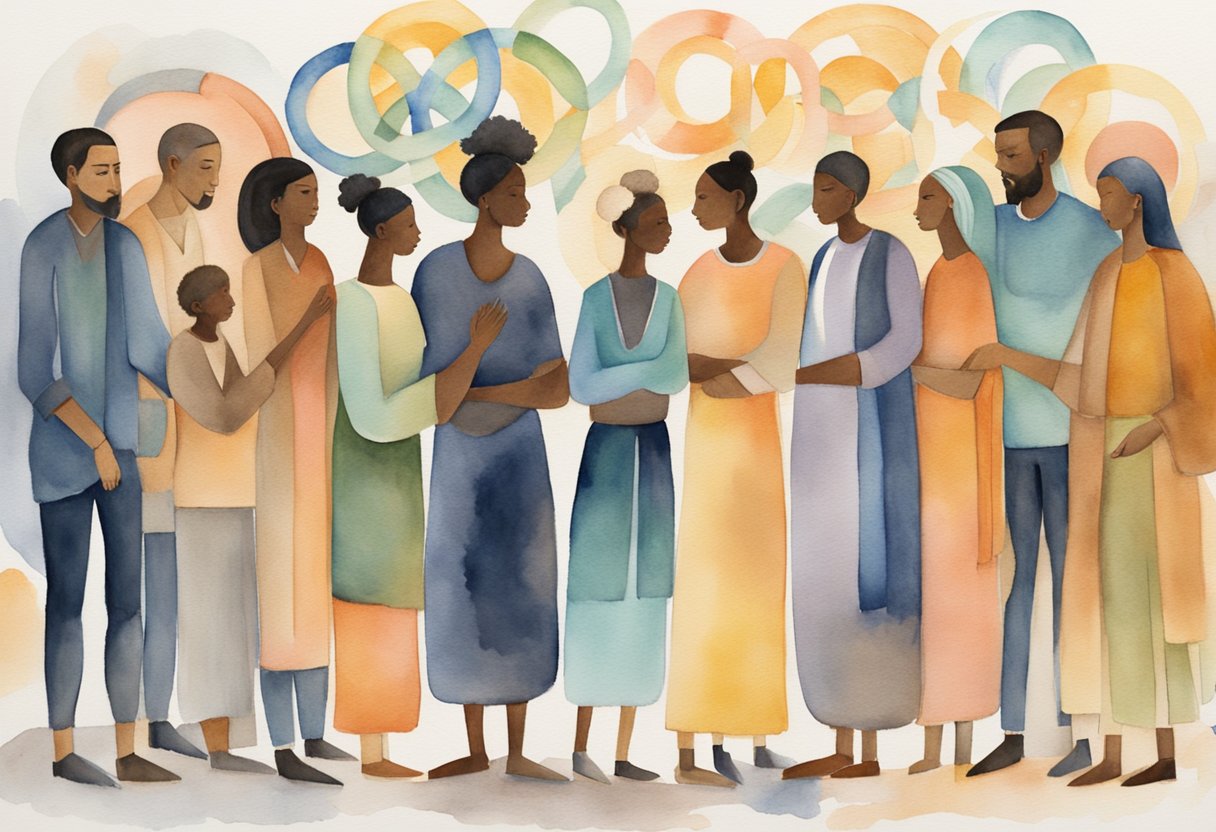A Guide to Empowering Your Journey

Embracing inner strength isn’t just a notion; it’s a vital practice for those who’ve faced cancer. We understand that our journey through illness isn’t solely about the physical trials but also the immense psychological resilience required to navigate the storm.
As men who have battled through lymphoma not once but twice, we’ve harnessed an incredible fortitude that’s become integral to our identity, shaping us into mentors for others walking this path.
We know that our well-being extends beyond medical treatments and encompasses the robust networks of support we’ve cultivated. Our community echoes our struggles and triumphs, reinforcing the belief that we emerge stronger together. In every challenge, adapting to changes and seizing control of our lives have been the stepping stones to empowerment and positive transformation.
Key Takeaways
- Resilience is central to overcoming cancer and enhancing our sense of self.
- Support networks provide strength and contribute to our well-being.
- Adapting to change fosters empowerment and encourages positive life shifts.
Understanding Cancer

Cancer, a journey that begins far before treatment, asks of us a resilience that’s both physical and emotional.
The Diagnosis Journey
When we receive a cancer diagnosis, we face a road that seems daunting. Diagnosis means understanding the type of cancer, its stage, and how it affects our bodies. For those of us navigating this, symptoms may have included unexplained weight loss, persistent fatigue, or pain that does not subside.
Our medical team will discuss the growth of cancerous cells and how much they’ve influenced our tissue or organs. The process will likely involve multiple tests, from blood panels to imaging scans, providing a complete picture that guides us toward the most effective management strategy.
Treatment and Recovery Options
With a diagnosis in hand, we turn our focus to treatment. Options vary widely, depending on the cancer’s type and progression. Surgery often becomes necessary to remove tumors, while chemotherapy targets cancer cells through the bloodstream, aiming to reduce or eliminate the disease. Our recovery hinges on these treatments and equally on the robustness of our immune system to handle the repercussions.
Post-treatment, our life may echo with the term “new normal,” embracing changes and fostering inner strength to reclaim our health and well-being. The path to recovery is custom to each of us as we look to strategies that bolster our physical state and support us in this shared, uncompromising contest against cancer.
Emotional Resonance and Mental Health

Emotional resilience shapes our journey through cancer, helping us to navigate a terrain riddled with uncertainty and challenge. We transform these trials into lessons of perseverance and hope.
Coping with Feelings
Amidst a cancer diagnosis, a whirlwind of emotions engulfs us. We may grapple with fear, anxiety, or a sense of loss. These responses are natural; they reflect our inner battle to reconcile with unexpected life alterations. Yet, in confronting these feelings, we tap into a hidden well of fortitude.
We engage with community support groups and individual counseling, finding solace and understanding in shared experiences. Strategies like mindfulness and focused breathing become our allies, fostering a space where we can process emotions without being overwhelmed.
Overcoming Sadness and Depression
It’s common for joy to feel like a visitor — fleeting and rare. Sadness and depression, on the other hand, sometimes seem like permanent residents in our lives after a cancer diagnosis. We combat these invasive thoughts by setting achievable goals and establishing a routine that fosters stability and predictability.
We pursue activities that once brought us joy, even if they don’t seem appealing. This could mean lacing up our sneakers for a morning jog, a nod to the therapeutic power of physical activity. By doing this, we reaffirm to ourselves that we can instill changes that have far-reaching positive effects on our mental state.
Physical Health and Well-Being
After facing lymphoma cancer, we understand that our well-being hinges significantly on our physical health. This journey has taught us to prioritize self-care and embrace activities that enhance our quality of life.
Importance of Self-Care
We’ve learned through experience that self-care is the foundation of our recovery and ongoing well-being. It includes adequate sleep, which helps mitigate fatigue and replenish our bodies. Ensuring seven to nine hours of restful sleep each night is a commitment we must commit ourselves to. Self-care also involves managing side effects from treatments, which can require adjustments in our daily routine to accommodate times when we feel less robust.
- Sleep: Aim for 7-9 hours
- Side Effects Management: Adjust routines as needed
Exercise and Nutrition
Regular exercise is like a reset button for us. As noted in a study on colorectal cancer patients, engaging in physical activity, whether it’s brisk walking or strength training, has helped us rebuild muscle and reduce body fat. We also learned that our bodies thrive on whole foods packed with nutrients. A balanced diet sustains our energy and supports overall well-being.
- Exercise: Include aerobic and strength training
- Nutrition: Focus on balanced, whole-food diets
It’s a collective journey where our resilience grows with each step toward nurturing our physical health. We understand that men like us, who have walked this path, benefit from a support system that encourages these lifestyle changes. It’s not just about surviving; it’s about thriving through self-care, exercise, and nutrition.
Internalizing Strength
Our journey through adversity, like our battles with lymphoma, demands that we harness latent energies within ourselves. We must recognize the vigor and determination that fuels our drive to thrive.
Harnessing Personal Power
We, as survivors, often discover that our greatest ally lies within—our power. This profound realization empowers us to face adversity head-on. Personal power is our inner resolve, the steadfast force that propels us to take control of our journey. Each decision we make, and every step we take toward well-being reinforces our command over our circumstances.
- Set clear goals: Begin with gradational, achievable targets.
- Celebrate small victories: Recognize each accomplishment, no matter how minor.
Building Resilience
Resilience is our scaffold in times of tribulation. Think of it as a muscle that requires consistent exercise to grow stronger. We develop this by confronting the challenges life throws at us and by deriving lessons from each encounter.
- Foster a supportive network: Relationships offer comfort and can buoy our spirits.
- Engage in activities that fortify the body and mind: Physical exertion and mental exercises enrich our capacity to rebound.
By embracing these practices, we, as men with cancer, can form a robust foundation of inner strength and resilience. Together, we fuel our collective empowerment and motivation, moving us beyond surviving to thriving.
Support Networks and Community

In overcoming cancer, we discover the immeasurable value of robust support systems and active community engagement.
The Role of Support Systems
Our battles with cancer, much like any arduous game plan, require a team effort. Cancer patients and survivors gain immense strength from well-structured support networks. These systems encompass family, friends, healthcare teams, and support groups. For men who have stood in the shadow of cancer, these networks act as a cheering crowd in a stadium, bolstering our morale and conviction to thrive.
Each cheer, each word of encouragement, strengthens our resolve. In face-to-face or online support groups, we exchange strategies like sharing plays in a playbook, gaining insights on managing side effects, tackling financial concerns, and adapting to new daily routines. This mutual support fosters an environment where cancer doesn’t overshadow our identity as fathers, sons, partners, and leaders.
Community Engagement
We score a win against cancer through personal victories and collective efforts in our communities. Engaging with the community means creating an alliance where experiences and knowledge are our currency. We educate, advocate, and support each other. Community engagement has proven to be an effective method to bridge gaps in cancer care and ensure everyone has a fair shot at quality treatment and support.
We, as survivors, spearhead local events, awareness campaigns, and fundraising activities, leveraging our leadership to rally the community toward greater health equity. Moreover, we offer our shoulders, share our stories of hope, and turn the tide together against cancer’s challenges. Through these actions, we build a stronger, more resilient cancer community where every member finds the strength to fight and the support to endure.
Positive Life Changes
Transforming our health and well-being after battling with lymphoma cancer comes down to making conscious lifestyle and mental shifts.
Lifestyle Adjustments
Integrating regular exercise into our routine rebuilds physical strength and contributes to emotional recovery. Team sports, in particular, offer camaraderie beyond physical fitness, helping us forge connections while staying active.
- In managing diet, we commit to nutritional choices that support our recovery and overall health.
- Balanced meals with ample vegetables, lean proteins, and whole grains.
- Reduced intake of processed foods and sugars to maintain energy levels.
Beyond nutrition and physical activity, we need to prioritize rest. Adequate sleep forms the backbone of our recovery, setting the stage for the body to repair and rejuvenate.
Spiritual and Mindful Practices
We recognize that healing transcends the physical; thus, we embrace meditation and yoga to enhance our mental clarity and inner peace.
- Meditation: Engaging in daily sessions to foster a calm mind and reduce stress.
- Morning meditation sets a serene tone for the day.
- Evening meditation helps us reflect and achieve restful sleep.
Integrating yoga into our weekly routine, we experience improved balance and flexibility, essential for physical recovery and maintaining control over our bodies.
Through these mindful practices, we cultivate resilience to life’s stresses and deepen our connection to ourselves and our journey forward.
Our engagement in these positive life changes reflects our commitment to survive and thrive with vigor and purpose.
Empowerment and Moving Forward

Our journey as survivors and thrivers defines where we’ve been and maps out the path we choose to embark upon next. It’s about transforming adversity into strength, harnessing our collective resolve for a future where we don’t just survive but thrive.
Embracing the Thriver Mindset
Grasping the thriver mindset starts with a choice—a conscious decision to seek out joy, purpose, and fulfillment beyond our encounters with cancer. As men who have braved the storms of lymphoma, not once but twice, we recognize the powerful force of shared inspiration. We unite in our resilience, determined to live each day with vigor and courage. Here’s how we foster this mindset:
- Focus on goals: Determine personal and professional aspirations to channel our energy into meaningful pursuits.
- Lean on peers for strength: Connect with fellow survivors whose stories inspire and whose support bolsters our resolve.
- Celebrate milestones: Acknowledge every victory, small or large, which fuels our transformation from survivors to thrivers.
Making Informed Decisions
Navigating our health journey requires making informed decisions that align with our values and goals. We arm ourselves with knowledge, understanding that empowerment springs from being well-informed. Together, we tackle this process:
- Seek multiple perspectives: Consult with various healthcare professionals to gather diverse opinions and treatment options.
- Understand the implications: Carefully weigh each decision’s benefits and potential risks.
- Collaborate on care: Actively engage with our healthcare team to chart a course that reflects our empowerment and determination for a healthier future.
In this pursuit, we craft a playbook for success, blending the determination honed in sports with a strategic approach to health. Our experiences, though personal and unique, form the bedrock of our cumulative wisdom, which we share with every man embarking on this challenge.
Final Thoughts…

Our journey with cancer, primarily as men who have faced the trials of lymphoma not once but twice, teaches us a potent lesson in resilience. We grow, adapting to each challenge and uncovering an inner strength that propels us forward. This path, while rough, carves out a survivor’s spirit no hurdle can defeat.
We transcend the label of “survivor,” becoming thrivers in our communities. Our experiences equip us with unique insights that we share, becoming beacons of hope and guidance for others. It’s not a solo endeavor; it takes a cohort of supporters, medical allies, and fellow thrivers to navigate the voyage of recovery and living post-cancer.
In the spirit of camaraderie, we foster a network that underscores the power of mutual encouragement. The lessons we’ve learned lead us to:
- Offer tangible support to peers, like organizing sport-based events that build community and promote well-being.
- Share strategies that work, like maintaining a balanced diet and engaging in regular physical activity, to bolster our bodies against recurrence and fatigue.
- Embrace mindfulness practices that sharpen our mental resilience, ensuring we are as robust in mind as in body.
To our brothers in this struggle, remember that every day is a chance to embrace your thriver’s journey. Let us lace up our sneakers for another run, hit another ball on the court, and stand tall, united in the face of adversity. We are not just men who had cancer; we are men with a profound narrative of triumph.
Together, we thrive. -T
Frequently Asked Questions
As we navigate the journey from diagnosis through recovery, we must arm ourselves with knowledge and practical strategies that address treatment and our well-being.
What are the key factors that contribute to thriving during cancer treatment?
For us men facing cancer treatment, resilience, a robust support network, and maintaining a positive outlook are pivotal. We often see that our will to persevere is bolstered by a blend of these psychological strengths with practical care strategies.
What are the overlooked aspects of cancer care patients should be informed about?
Key elements often neglected in cancer care include nutritional guidance and emotional support. We need to understand how nutrition aids our body during treatment. Moreover, openness to counseling and support groups can provide essential emotional sustenance.
In what ways can a cancer patient’s lifestyle affect their prognosis and quality of life?
Adjusting our lifestyle, such as regular exercise and a balanced diet, plays a role in our journey. These changes can influence our prognosis and elevate our daily quality of life, giving us more energy and better mental health.
What strategies do survivors of advanced-stage cancer attribute to their recovery?
Survivors cite a multifaceted approach, including adherence to prescribed treatments, participation in clinical trials, and complementary therapies. These strategies and a resilient mindset have been the backbone of many recoveries.
How can someone draw upon their inner strength to cope with a cancer diagnosis?
We can tap into our inner strength by setting realistic goals and celebrating small victories. This approach empowers us, reinforcing our resolve and ability to face challenges head-on.
What are practical communication tips for discussing sensitive issues with your oncology team?
We should aim to speak openly and clearly with our oncology team, preparing questions in advance and seeking clarifications when needed. This encourages a mutually respectful dialogue where concerns are addressed and our needs are met.
